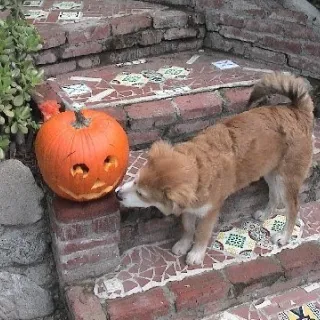Seasonal Changes and Your Senior Dog
As we roll into autumn, many humans experience some sort of mood shift due to plunging temperatures and pushing back the clocks. It’s the time of year with shorter days, colder temperatures and sometimes bouts of the winter blues. Sluggishness, or just a desire to do nothing and hunker down indoors, is known as Seasonal Affective Disorder (SAD). No one knows for sure, but the same moodiness may affect your pet since we share much of the same chemistry in our brains.
When darkness increases, the brain produces less serotonin (the happy chemical) and more melatonin (the sleep maker), so it is possible that our dogs and cats get lazy too. However, often our pets mirror our own moods, so if we’re lethargic, so are they. Dogs in particular might become bored as they aren’t spending as much time outdoors, so maybe we need to engage them and become active to prevent four-legged couch potatoes.
1. Hide toys or treats around the house to engage their hunting instincts. Take part in the game and be in the moment like they are.
2. If your dog isn’t spending as much time outdoors, move his bed near a sunny window. Open those shades when the sun comes up and get that natural sunlight into the house for everyone’s sake. The more light we let enter our pupils, the more brain chemistry is positively affected.
3. Actually go outdoors when it’s comfortable for your pet but make sure your dog is properly adorned: booties to protect paws from rain, snow, ice, salt and chemicals will keep your dog’s fur clean and dry and prevent icicles between the toes.
Also carry a flashlight, headlamp, or suit up your dog in a harness that is lit or has good reflective materials so that you both can be seen when daylight hours are shorter, allowing you to walk safely whether the sun hasn’t yet come up or has already gone down.
When it gets cold outside, some appetites wane while others increase. Studies have shown pets eat more in October, November, December, January and February--the coldest months of the year. As daylight hours decrease and temperatures lower, animals need more energy to keep themselves warm, but be careful about overfeeding. According to the Association for Pet Obesity Prevention, 53% of adult dogs and 55% of cats in the United States are overweight. Interestingly, 22% of dog owners and 15% of cat owners said their pet’s weight was normal when it was actually overweight or obese. Just like in humans, obesity can lead to diabetes; osteoarthritis; high blood pressure; skin disease; thyroid problems; heart, respiratory, and kidney disease; some cancers; and decreased life expectancy. Don’t let those sad puppy dog eyes convince you to overfeed your pet in winter. Remember, he’s probably (and should be) spending most of his time in the warm indoors right by your side, so does not need those extra calories to stay warm like his wolf cousins. Your heating system however, may be drying out his skin and since cold weather can exacerbate the aches and pains of stiff joints, add coconut oil to his diet or massage it right into the skin.
As the seasons change, we may all want to sleep in and hit the sack early, but by making a few adjustments, we can keep our best friends healthy, safe and happy. Don’t forget however, the most important thing of all is spending quality time together.



